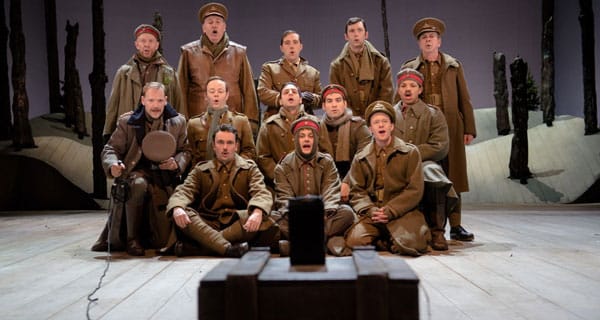
The Christmas Truce
Royal Shakespeare Theatre
31 January 2015
2 Stars
Facts can provide the solid foundation for great theatrical experiences. Who knows the facts of the incidents surrounding trench warfare in Belgium in 1914, in the first year of World War One, well enough to be bored by revelations about that time? No one who was actually there is still alive, presumably?
Would modern audiences want to know the rigours endured by the Royal Warwickshire Regiment in their Ploegsteert Wood trenches after an unsuccessful attack on their German counterparts? The role fog played in letting those stranded in No Man’s Land escape? The activities of Captain Bruce Bairnsfather who became famous world-wide for his cartoons from the front and his creation of the “walrus-moustached old soldier’, Old Bill, who appeared regularly in The Bystander magazine? That Silent Night was virtually unknown in Britain in December 1914? That it was a German order on Christmas Eve that “no shot is to be fired tonight or on Christmas Day unless in retaliation”? That Bairnsfather and a Sergeant ventured first into No Man’s Land and met up with Germans, both sides willing and eager to celebrate the notion of “goodwill to all men”, even in this most unlikely of places? That English orders were given that the truces cease?
Surely, these matters could easily provide stimulating fodder for a thoughtful, funny, and heart-warming Christmas Theatrical treat? For my part, there is no doubt. Presumably that is what the RSC thought also, when commissioning a play from Phil Porter in 2013, a play which would become The Christmas Truce which, directed by Erica Whyman, has just finished a season at the Royal Shakespeare Theatre in Stratford Upon Avon.
Except that The Christmas Truce is a facile, shabby conglomeration of stock situations and characters, badly sung Christmas carols, an interminable “entertainment for the lads” sequence, endless dreary cricketing allusions but, essentially, no story or narrative pulse. It’s akin to the unruly spawn of the worst episode of Dad’s Army, a rip-off of The Crimson Field and an amateur pantomime. When a Sainsbury’s Christmas advertisement evoking the truce in the trenches has more substance, intrigue and sheer heart than a play funded and produced by the RSC, you know the world is out of kilter. But there it is.
If Porter had adhered more closely to the facts and sought to remind and illuminate audiences about them, this might have been worthwhile. But he doesn’t. And his fiction is not remotely as engaging as the truth.
Erica Whyman’s direction does nothing to elevate the writing into something worthwhile. The pace is sluggish and the acting mostly heavy-handed; awkwardness in the writing is not smoothed out or covered over by the production. Tom Piper provides a nice, stark set, but the entire proceedings had the feel of a celebratory function carried out by well-meaning locals at a village hall.
Where Les Miserables uses a shaft of white light to designate the death of a character, here, for the main part, Whyman uses the image of a chap running up to bowl to a wicket as the symbol of passage from one world to the next. Quite why is never clear.
Much of the acting is lamentable and it is quite hard to believe that many of the cast appear also in the double season of Love’s Labours Lost and Love’s Labours Won.
There are some saving graces. Peter McGovern has a lovely scene as Harris where he makes a speech about fallen comrades; it is genuinely affecting and beautifully done. Frances McNamee is a spirited war nurse, Phoebe, and although her scenes were quite dreadfully written, melodramatic and unbelievable, McNamee imbues them with energy and zest.
Gerard Horan did all he could with the part of Old Bill, the war-weary old trooper who is the father figure, or one of them, of the lads in the trenches. His crusty, wise, old warhorse was refreshingly dry and understated. Chris Nayak is enthusiastically jolly as the jokey Tallis and makes more out of the part than many would. Nick Haverson makes a fine fist of the quirky Leutnant Kohler.
Oliver Lynes is the best of the bunch, first as the happy lad, Liggins, whose life is snatched away by a sniper and then as the dour German pragmatist, Schmidt, with a nice line in “Scheiße!” and the funniest line in the play (about pig droppings).
Everyone else either gets by, seems embarrassed to be there, or is unaccountably bad. Most disappointing of all was Joseph Kloska’s unappealing and blisteringly bland Bairnsfather. He was painful to endure, especially in the ludicrous “drag” routine when he dropped character several times. Charmless.
The greatest disappointment here is the missed opportunity. The RSC could have created a masterful work that gave great insight into the remarkable events of that Belgian December 1914. Instead, they settled for The Christmas Truce.
